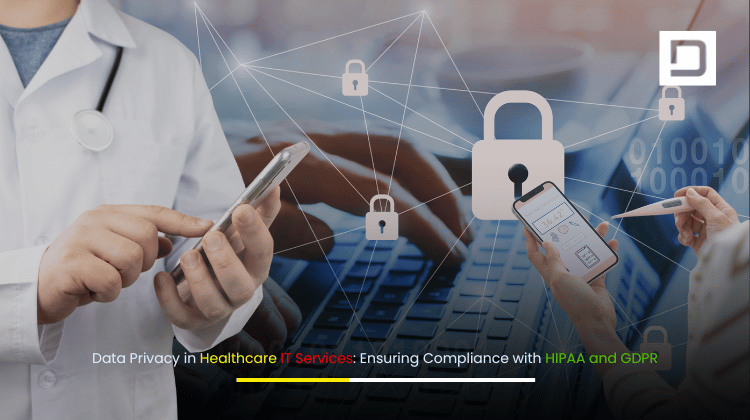Data Privacy in Healthcare IT Services: Ensuring Compliance with HIPAA and GDPR
In today’s digital-first healthcare landscape, data privacy in healthcare IT services is more critical than ever. From hospitals to telehealth startups, every organization managing patient data faces strict regulations and mounting cybersecurity threats. Ensuring compliance with major data protection laws like HIPAA (Health Insurance Portability and Accountability Act) and GDPR (General Data Protection Regulation) is not just a legal necessity but also a cornerstone of trust and brand reputation.
Healthcare providers, insurers, software vendors, and even medical device manufacturers are increasingly leveraging advanced IT solutions to improve patient care, streamline operations, and reduce costs. However, with these advancements comes the responsibility to safeguard sensitive personal health information (PHI) and personally identifiable information (PII).
This comprehensive guide from Depex Technologies explores everything you need to know about data privacy in healthcare IT, from understanding regulatory frameworks like HIPAA and GDPR to implementing best practices for compliance, risk management, and technology selection.
Why Data Privacy Matters in Healthcare IT Services
The Value of Healthcare Data
Healthcare data is among the most sensitive and valuable types of information. It includes medical histories, diagnoses, test results, treatments, insurance details, and billing records. Any breach can result in severe consequences for patients and organizations:
- Patient harm: Identity theft, insurance fraud, or discrimination
- Reputational damage: Loss of trust and patient attrition
- Financial losses: Regulatory fines, lawsuits, and remediation costs
- Operational disruption: Downtime, data loss, and workflow interruptions
With the growing adoption of electronic health records (EHRs), telemedicine, mobile health apps, and IoT medical devices, safeguarding data privacy is no longer optional.
Key Data Privacy Regulations: HIPAA and GDPR
HIPAA Overview (For US-Based Healthcare)
HIPAA is the foundational law for data privacy in US healthcare. It establishes national standards for protecting PHI held by covered entities (healthcare providers, insurers, clearinghouses) and their business associates.
Key HIPAA Rules:
- Privacy Rule: Regulates the use and disclosure of PHI.
- Security Rule: Sets standards for securing electronic PHI (ePHI) via technical, physical, and administrative safeguards.
- Breach Notification Rule: Requires organizations to notify affected individuals and authorities about data breaches.
- Enforcement Rule: Outlines penalties for non-compliance.
HIPAA applies to:
- Hospitals, clinics, doctors, and pharmacies
- Health plans and insurance companies
- Healthcare clearinghouses
- Any vendor or partner handling PHI (e.g., software companies, cloud providers)
GDPR Overview (For EU and Global Healthcare Providers)
GDPR is the primary data protection law for organizations processing the data of EU citizens, regardless of the organization’s location. GDPR has global reach and often applies to healthcare IT solutions serving international patients.
Key GDPR Principles:
- Lawfulness, fairness, transparency: Data must be collected and used legally and transparently.
- Purpose limitation: Data collected for a specific purpose must not be used for other reasons.
- Data minimization: Only necessary data should be collected.
- Accuracy: Data must be kept accurate and up to date.
- Storage limitation: Data must not be kept longer than necessary.
- Integrity and confidentiality: Data must be securely protected.
Key GDPR Rights:
- Right to access, rectify, or erase personal data
- Right to restrict processing or object to data usage
- Right to data portability
GDPR applies to:
- Any organization processing EU residents’ data (including telehealth apps, clinical trials, insurance portals, etc.)
Major Challenges in Ensuring Data Privacy in Healthcare IT
- Complex Regulatory Landscape: Organizations may need to comply with multiple data protection laws depending on their geography and patient demographics.
- Legacy Systems: Older IT systems may not have built-in privacy or security features.
- Third-Party Risks: Healthcare providers often rely on vendors and partners, increasing the risk of data leakage.
- Rapid Digital Transformation: Telemedicine, mobile health, and IoT expand the attack surface for cyber threats.
- Human Error: Mistakes in handling data, weak passwords, and lack of staff training often cause breaches.

Features of Robust Healthcare IT Services for Data Privacy
End-to-End Encryption
All patient data—whether stored, transmitted, or processed—must be encrypted using industry-standard algorithms (e.g., AES-256). This ensures that even if data is intercepted, it remains unreadable.
Access Controls and Authentication
Only authorized personnel should have access to PHI or PII, using role-based access control (RBAC), strong password policies, and multi-factor authentication (MFA).
Audit Trails and Monitoring
Every access or modification to sensitive data should be logged, monitored, and reviewed. Automated alerts can help detect suspicious activity early.
Data Masking and Anonymization
For research, training, or analytics, de-identify or anonymize data to protect patient identities while still enabling valuable insights.
Secure Cloud Storage and Backup
Choose healthcare-compliant cloud service providers (like AWS, Azure, or Google Cloud) with end-to-end security certifications and automated backup/restore capabilities.
Automated Compliance Checks
Leverage software tools that continuously monitor for compliance gaps, update risk assessments, and generate compliance reports for HIPAA and GDPR.
Regular Security Assessments
Conduct periodic vulnerability assessments, penetration testing, and risk audits to identify and remediate weaknesses before attackers do.
Breach Response Plans
Have clear policies and procedures for breach notification, including defined roles, communication strategies, and remediation steps.
How to Achieve HIPAA and GDPR Compliance in Healthcare IT
Conduct a Data Privacy Impact Assessment (DPIA)
Identify what types of data you collect, process, store, and share. Map data flows, assess privacy risks, and document mitigation strategies.
Update Privacy Policies and Patient Consent Forms
Ensure transparency with patients by clearly explaining what data is collected, why, how it’s used, and their rights. Obtain explicit, informed consent where required.
Implement Technical Safeguards
- Encryption: Secure all ePHI and PII in storage and transit.
- Access controls: Limit access based on job roles.
- Automatic session timeouts: Prevent unauthorized access on unattended devices.
- Regular patching: Keep systems and software up to date to prevent exploitation.
Establish Administrative Safeguards
- Employee training: Educate staff about data privacy, social engineering risks, and how to spot phishing attempts.
- Vendor management: Ensure all third-party vendors and partners sign Business Associate Agreements (BAAs) and are compliant.
- Incident response: Prepare a detailed plan for responding to breaches, including notification requirements.
Monitor, Audit, and Update Regularly
Healthcare data privacy is not a “set and forget” task. Continuous monitoring, regular audits, and prompt remediation of identified gaps are crucial for ongoing compliance.
Key Benefits of Data Privacy Compliance in Healthcare IT
- Legal Protection: Avoid hefty fines and lawsuits from regulatory non-compliance.
- Enhanced Trust: Patients, partners, and insurers are more likely to engage with organizations prioritizing privacy.
- Competitive Advantage: Robust compliance can differentiate your business and attract clients or investors.
- Operational Efficiency: Streamlined data processes reduce errors, rework, and security incidents.
- Future Readiness: Prepare for evolving regulations and new technologies with a privacy-first approach.
The Role of Technology Partners in Healthcare Data Privacy
Choosing the right IT partner is critical for HIPAA and GDPR compliance. Depex Technologies offers:
- Custom software development with compliance baked in
- Integration of secure EHR/EMR solutions
- Implementation of privacy and security frameworks
- Cloud migration and secure hosting
- Continuous compliance monitoring and support
Depex Technologies understands the unique needs of healthcare clients, from hospitals and clinics to telemedicine startups and insurance platforms.
Future Trends: Data Privacy in Digital Healthcare
- AI and Machine Learning Security: As AI adoption grows in diagnostics and remote care, ensuring algorithmic transparency and privacy will be key.
- Interoperability and Data Portability: Patients demand seamless access to their records across providers, raising privacy challenges.
- Zero Trust Architectures: Organizations are moving beyond traditional firewalls to “zero trust” models where no user or device is automatically trusted.
- Greater Patient Control: Expect more granular controls, allowing patients to decide who can access specific elements of their health data.
- Blockchain for Healthcare Privacy: Blockchain can enable secure, auditable, and tamper-proof health data sharing and consent management.
Practical Checklist: HIPAA and GDPR Compliance for Healthcare IT
- Encrypt all patient data at rest and in transit
- Use role-based access control and strong authentication
- Maintain detailed audit logs of data access and changes
- Regularly train all staff on privacy and security protocols
- Update privacy policies and obtain informed consent
- Conduct regular security assessments and patch management
- Ensure vendor and third-party compliance (with contracts/BAAs)
- Develop and test a breach response plan
- Offer patients easy access, correction, and deletion of their data
- Use only healthcare-compliant cloud service providers
Final Conclusion:
Data privacy in healthcare IT services is not just a regulatory requirement—it’s a fundamental pillar for delivering safe, ethical, and patient-centric care in the digital age. Whether you operate in the US, the EU, or globally, ensuring HIPAA and GDPR compliance protects your organization from risks while building lasting trust with patients and partners.

Ready to elevate your healthcare IT with world-class privacy and compliance?
Depex Technologies specializes in developing secure, robust, and scalable healthcare solutions tailored to your compliance needs. From custom EHR/EMR systems to telehealth platforms and secure patient portals, we ensure every layer of your application is designed for privacy, security, and regulatory alignment.
Contact Depex Technologies today for a free consultation and discover how we can help you achieve seamless, HIPAA and GDPR-compliant healthcare IT transformation.






